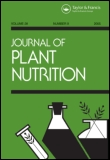
JOURNAL OF PLANT NUTRITION
Scope & Guideline
Exploring Nutrient Dynamics for Enhanced Crop Productivity
Introduction
Aims and Scopes
- Plant Nutrient Management:
Research focused on optimizing the application of macronutrients (N, P, K) and micronutrients (e.g., Zn, Fe, B) to improve crop yield and quality. - Soil Health and Fertility:
Studies investigating the impact of various soil amendments, organic matter, and biofertilizers on soil fertility and health, aiming to enhance nutrient availability for crops. - Stress Mitigation through Nutrient Management:
Research examining how nutrient application can alleviate abiotic stresses (such as drought and salinity) affecting plant growth and productivity. - Biofortification and Nutritional Quality:
Exploration of methods to enhance the nutritional content of crops through targeted nutrient management, including the use of biofortification techniques. - Innovative Fertilization Techniques:
Investigation of novel fertilization approaches, including the use of nanotechnology, slow-release fertilizers, and microbial inoculants to enhance nutrient use efficiency.
Trending and Emerging
- Sustainable Agriculture Practices:
There is an increasing focus on research that promotes sustainable agricultural practices, integrating organic and inorganic nutrient sources for enhanced soil health. - Climate Resilience and Nutrition:
Emerging studies are emphasizing the role of nutrient management in enhancing crop resilience to climate change impacts, particularly concerning water and nutrient stress. - Microbial and Biostimulant Applications:
Research on the use of plant growth-promoting rhizobacteria (PGPR) and biostimulants is trending, highlighting their role in improving nutrient uptake and plant growth. - Precision Agriculture and Nutrient Management:
The integration of precision agriculture technologies in nutrient management strategies is gaining traction, focusing on optimizing fertilizer use efficiency. - Intercropping and Nutrient Dynamics:
There is a growing interest in exploring intercropping systems and their influence on nutrient dynamics, soil health, and crop yield.
Declining or Waning
- Traditional Chemical Fertilizers:
Research related to conventional chemical fertilizers is declining as interest shifts towards sustainable and organic farming practices. - Single Nutrient Studies:
There is a waning focus on studies examining the effects of single nutrient applications, as integrated nutrient management approaches gain prominence. - Soil Contamination Studies:
Research addressing soil contamination from fertilizers and its effects on plant health and productivity is becoming less frequent, possibly overshadowed by studies on sustainable practices. - Conventional Crop Varieties:
Investigations into the nutritional management of traditional crop varieties are declining, with more emphasis being placed on genetically improved or biofortified varieties. - Generalized Nutrient Deficiency Studies:
Studies providing generalized insights on nutrient deficiencies without specific context or innovative solutions are seeing reduced interest.
Similar Journals
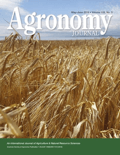
AGRONOMY JOURNAL
Exploring the Future of Agronomy and Crop ScienceThe Agronomy Journal, published by Wiley, is a leading platform for cutting-edge research in the field of agronomy and crop science. Established in the United States, this prestigious journal carries the ISSN 0002-1962 and E-ISSN 1435-0645, with its coverage spanning from 1976 to 2024, showcasing a wealth of knowledge over decades. The journal is recognized in the top quartile (Q1) of its category, making it a highly respected source for quality literature, ranking #108 out of 406 in the Scopus database and reflecting a 73rd percentile standing in agricultural and biological sciences. While it operates under traditional access options, its commitment to disseminating valuable scientific inquiry aligns with the objectives of advancing sustainable agricultural practices globally. The Agronomy Journal serves as an indispensable resource for researchers, professionals, and students eager to stay abreast of significant advancements and discussions influencing the future of crop science and agronomic research.
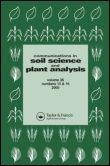
COMMUNICATIONS IN SOIL SCIENCE AND PLANT ANALYSIS
Elevating the Standards of Soil and Plant ResearchCOMMUNICATIONS IN SOIL SCIENCE AND PLANT ANALYSIS, published by Taylor & Francis Inc, is a prestigious journal dedicated to advancing research in the fields of agronomy, crop science, and soil science. Established in 1970, the journal has maintained a significant presence over the years, with a commitment to publishing high-quality, peer-reviewed articles that contribute to the understanding of soil and plant interactions. With an impressive Q2 ranking in both Agronomy and Soil Science, it positions itself as a vital resource for researchers, professionals, and students alike, keen on exploring innovative solutions to contemporary agricultural challenges. Although it currently does not provide open access, the journal ensures wide dissemination through its established subscription services. The journal's focus on empirical research, methodologies, and technological advancements in soil management and plant nutrition makes it an essential platform for disseminating knowledge and fostering discussions within the scientific community. Located in the heart of Philadelphia, USA, it remains a significant contributor to the global dialogue on sustainable agriculture and environmental stewardship.

Agronomy-Basel
Empowering Innovation in Agronomy and Crop ScienceAgronomy-Basel is a leading international journal dedicated to advancing the field of agronomy and crop science, published by the respected MDPI. Since its inception in 2011, this open-access journal has provided a vital platform for the dissemination of high-quality research, featuring innovative studies and reviews that contribute to the understanding of agricultural practices and crop management. With an impressive impact factor and ranked in the Q1 quartile of its category for 2023, Agronomy-Basel has established itself as a premier resource in the realm of Agricultural and Biological Sciences, achieving a commendable rank of #62 out of 406 in its field, placing it in the 84th percentile. The journal targets researchers, professionals, and students who are dedicated to enhancing agricultural sustainability and productivity. Located in Basel, Switzerland, the journal's commitment to open access empowers global accessibility to flourishing agricultural advancements, thus fostering collaboration and innovation across the globe.
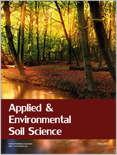
Applied and Environmental Soil Science
Advancing sustainable solutions for soil and environmental health.Applied and Environmental Soil Science, an esteemed journal published by HINDAWI LTD, focuses on disseminating high-quality research in the fields of soil science and environmental applications. With an ISSN of 1687-7667 and an E-ISSN of 1687-7675, this open-access journal has been a vital resource for the academic community since its inception in 2009. As of 2023, it holds a commendable position in the Q2 category for both Earth-Surface Processes and Soil Science, highlighting its impact in these crucial disciplines. The journal’s rankings further affirm its significance within the field, being placed 61st in Earth and Planetary Sciences and 58th in Agricultural and Biological Sciences. Researchers and practitioners alike benefit from the collaborative platform it offers for sharing innovative studies essential for sustainable soil management and environmental integrity. With a focus on advancing knowledge and fostering interdisciplinary dialogue, Applied and Environmental Soil Science stands as a crucial pillar for scholars and professionals dedicated to addressing the pressing challenges of soil and environmental health.
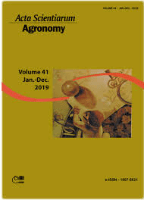
ACTA SCIENTIARUM-AGRONOMY
Driving excellence in agronomy for a thriving planet.ACTA SCIENTIARUM-AGRONOMY is a prestigious, peer-reviewed journal published by UNIV ESTADUAL MARINGA, PRO-REITORIA PESQUISA POS-GRADUACAO, focusing on advanced research in the field of agronomy and crop science. Since its inception as an Open Access journal in 2007, it has significantly contributed to disseminating high-quality research, allowing unrestricted access to its content for a global audience. Operating from Brazil, the journal holds a notable Q2 category ranking in Agronomy and Crop Science as of 2023, validating its importance within the academic community. The journal’s Scopus ranking positions it in the 49th percentile among Agricultural and Biological Sciences, indicating a robust foundation for impactful research. With a commitment to innovation and scientific excellence, ACTA SCIENTIARUM-AGRONOMY aims to provide researchers, professionals, and students with vital insights that drive forward our understanding of agriculture and its environmental implications.
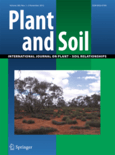
PLANT AND SOIL
Nurturing scientific dialogue for a sustainable future in agriculture.PLANT AND SOIL is a prestigious academic journal that has been at the forefront of plant and soil research since its inception in 1948. Published by SPRINGER in the Netherlands, this journal has carved a niche as a leading source of high-quality, peer-reviewed articles, which are essential for researchers, professionals, and students in the fields of Plant Science and Soil Science. With an impressive impact factor placing it in the Q1 category of both disciplines, it ranks 50th in the field of Plant Science and 24th in Soil Science, highlighting its influence in the scientific community. Although not available as open access, the journal provides a wealth of knowledge and insights into the interactions between plants and soils, exploring critical topics such as soil health, crop productivity, and sustainable agriculture practices. Researchers who wish to contribute to this vital area of study through their empirical findings will find PLANT AND SOIL to be an invaluable platform for disseminating their work and connecting with a network of leading scholars committed to advancing our understanding of these essential ecosystems.
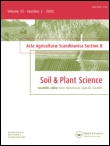
ACTA AGRICULTURAE SCANDINAVICA SECTION B-SOIL AND PLANT SCIENCE
Empowering Researchers to Shape Sustainable Agricultural PracticesACTA AGRICULTURAE SCANDINAVICA SECTION B-SOIL AND PLANT SCIENCE, published by Taylor & Francis AS, is a distinguished journal dedicated to the fields of Agronomy, Crop Science, and Soil Science. With an impressive impact factor, and categorized in Q2 for both Agronomy and Crop Science and Soil Science as of 2023, this journal is an essential resource for researchers, professionals, and students aiming to advance their understanding of soil-plant interactions and sustainable agricultural practices. Operating since 1992 and continuing through to 2024, ACTA aims to publish high-quality, peer-reviewed research that encourages the applicability of advanced scientific knowledge in real-world agricultural settings. While the journal is not open access, it remains widely accessible through institutional subscriptions, reflecting its commitment to disseminating essential findings and fostering innovation in soil and plant science worldwide. Nestled in the vibrant academic environment of Norway, ACTA AGRICULTURAE SCANDINAVICA serves as a key platform for nurturing groundbreaking research that informs sustainable agricultural policies and practices globally.
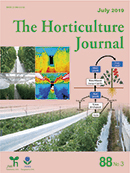
Horticulture Journal
Cultivating Knowledge, Growing FuturesThe Horticulture Journal, published by the Japan Society for Horticultural Science, is a leading academic platform dedicated to the advancement of horticultural research and practices. With an ISSN of 2189-0102 and an E-ISSN of 2189-0110, this journal endeavors to publish high-quality research that emphasizes innovative techniques, sustainable practices, and the science of plant cultivation. The journal has been recognized for its impact within the field, currently holding a Q2 ranking in Horticulture and a Q3 ranking in Plant Science as of 2023, indicating its significant contribution to advancing knowledge. With its open-access model, researchers, professionals, and students have the opportunity to engage with the latest findings, thanks to the journal's commitment to widespread dissemination of information. Since its convergence period began in 2015 and continuing through to 2024, the Horticulture Journal remains instrumental in promoting sustainable and beneficial practices in horticulture science globally.

Journal of Soil Science and Plant Nutrition
Fostering sustainable practices through cutting-edge research.The Journal of Soil Science and Plant Nutrition, published by SPRINGER INT PUBL AG, is a premier academic journal dedicated to advancing the fields of agronomy, plant science, and soil science. With an impressive Q1 ranking in both Agronomy and Crop Science and Plant Science, alongside a Q2 ranking in Soil Science, this journal stands at the forefront of innovative research and knowledge dissemination. Annually indexed in key databases, it provides a platform for high-quality research articles that explore the complex interactions between soil health and plant nutrition, contributing significantly to sustainable agricultural practices. Although it does not offer open access options, the journal is accessible through various academic institutions and libraries, ensuring a wide readership. With its emphasis on impactful findings, the journal is an essential resource for researchers, professionals, and students aiming to further their understanding and application of soil and plant science in an ever-evolving global context.

Journal of Elementology
Innovating methodologies for a healthier planet.The Journal of Elementology, published by the Polish Society Magnesium Research, serves as a vital resource in the fields of Ecology, Health, Toxicology and Mutagenesis, Inorganic Chemistry, and Pollution. With an ISSN of 1644-2296 and a continuous publication record since 2008, this journal provides a platform for the dissemination of significant research findings and innovative methodologies. Although it operates under a traditional access model, its contributions are vital for advancing understanding in environmentally and health-related chemical studies, especially concerning elemental research. The journal is classified in the Q4 quartile across various categories, indicating emerging research insights that can strengthen foundational knowledge and foster further exploration in these vital areas. Authors and researchers can benefit from the journal's focus on comprehensive and practical studies, aimed at addressing both theoretical and applied aspects of element-related research, as it contributes to the scientific community's collective efforts toward sustainable environmental practices.